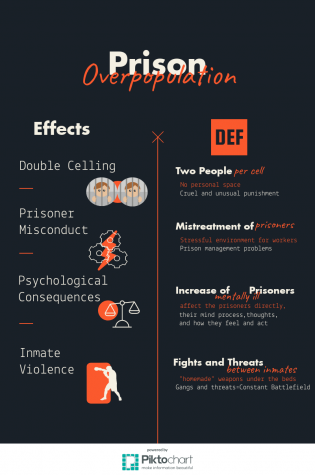The problem with our prisons
December 18, 2017
With the prison population increasing, and the re-offending prisoners rising rapidly in our country, this country needs to take action and provide a new system to organize prisons. Prison overpopulation can cause problems inside the prison walls, including double celling, prisoner misconduct, psychological consequences, and inmate violence.
Double celling violates the inmate’s legal amount of given space, addressed in a legal case in 1981 that labeled overcrowding as potentially cruel and unusual punishment.
Prisoner misconduct relates to prison management and overpopulation creates a far more stressful environment for the corrections officers and wardens.
Psychological consequences affect the prisoners directly, mainly their mind process, their thoughts, or how they feel and act towards other people. Mental health care behind bars focuses on stabilizing, rather the treating inmates. This means that most inmates do not receive the proper treatment for any mental health issues they acquire in prison or existing conditions prior to incarceration. Prisoners sexually abused every year ranges in the 70,000’s, according to reports of the Department of Justice (DOJ), adding to the violence, threats and gangs located in the multitude of prisons across America, resulting in trauma for most prisoners.
Isolation from the outside world, friends and family, can also lead to depression and anxiety, common but harsh mental diseases that can make one insane.
Most prisoners are ultimately released, but the mental diseases they obtain in captivation highly increases their risks of reoffending and make it difficult to reenter society as a valuable, nonviolent citizen. Almost 70% of people arrested continue their streak and ultimately end up right where they started within 3 years after their release. The state of mental health care in prisons could play a significant role in this high rate of re-offenders.
The mental health issues, the violence, and limited space in confinement lead to a multitude of other problems in and out of the prison walls. The mental health harms the prisoner’s ability to return to normal life once released and may put innocents in danger outside of the confinement.
A new organization of prisoners would categorize them by the number of years in prison, repeat offenders, and any prisoners with mental health issues. This type of organization would keep the mentally ill looked after, and separate the one to two year servers away from the influence of the prisoners serving life sentences, therefore decreasing the number of reoffenders.
This organization would also keep pre-prison and post-prison psychological changes within the prison walls.
Overall, this system would help keep track of prison records and gradually bring down the amount of prisoners in the United States.





